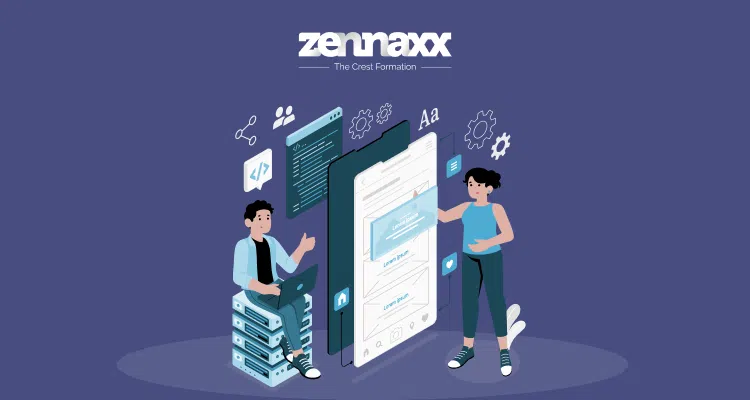So, everything must be sorted before launching it to the public. This includes choosing the right Android app development framework to build it.

Market Share and User Base
- Global Market Share: Android consistently holds the largest market share among mobile operating systems, surpassing iOS and other platforms.
- User Base: Billions of users worldwide rely on Android devices for their daily needs, making it a massive potential audience for app developers.
- The revenue in the app development sector is expected to show an annual growth rate of 7.89% resulting in a market volume of USD 218.80 billion by 2027. Most of this revenue will be generated in the United States (USD 74,830 million in 2022)
10 Best Frameworks for Android App Development Frameworks
Since we all know how important the Android App Development Frameworks are today. Here we understand every single word with their key features.
Get to know more about each Android framework, as they hold an individuality for developing different types of mobile applications.
1. Ionic
It simplifies the development process by allowing developers to write code once and deploy it across multiple platforms.
Ionic is particularly beneficial for building hybrid and interactive mobile apps. With its capabilities, developers can easily create apps. They can use complex gestures and lots of animations.
Features
- Cross-platform compatibility: Write code once and deploy it on both Android and iOS.
- Rich library of pre-built components: Speed up development with a wide range of UI components.
- Strong community support: Many developers contribute plugins, resources, and tutorials.
- Built on Angular: Leverage the power of Angular for building robust apps.
- Native performance: Access native device features with Cordova or Capacitor plugins.
2. Xamarin
This framework allows businesses to deliver exceptional performance and unique user experiences. Xamarin uses an abstraction layer to efficiently manage communication between shared and platform-specific code.
Features
- Code sharing: Share up to 90% of code across platforms, making development more efficient.
- Native performance: Provides native API access, ensuring apps perform like native Android applications.
- Microsoft support: Benefit from seamless integration with Visual Studio and Azure.
- Strong debugging tools: Utilize comprehensive debugging capabilities, including real-time testing and error checking.
3. Adobe PhoneGap
PhoneGap is one of the most accessible frameworks. Developers favor it for its simplicity and ease of use. It supports HTML5, CSS3, and JavaScript, making it an ideal choice for developing cross-platform apps.
Features
- Cross-platform development: It helps to develop mobile applications for all three platforms (Android, iOS, and Windows) with a single codebase.
- Plugins: Consists of plugins that let you access native device features, like the camera, GPS, and file system.
- Cloud-based builds: Build apps in the cloud without needing to install complex SDKs.
- Strong community: Benefit from a vast ecosystem of plugins, extensions, and third-party tools.
- Ease of integration: Easily integrate with other Adobe tools like Creative Cloud and PhoneGap Build.
4. React Native
In 2015, Facebook introduced React Native, which has become a leading cross-platform framework for Android app development.
This framework makes development much faster and more efficient. It’s also cost-effective, which reduces expenses. Notably, popular apps like Facebook and Instagram are built with React Native. This shows its widespread adoption.
They can be easily modified and enhanced as needed. Also, React Native gives users a smooth experience. It allows for fast operation without worries about data storage limits.
Features
- Native components: Utilize native components for enhanced performance and responsiveness.
- Hot Reloading: See changes in real time without rebuilding the entire app.
- Strong community support: Extensive libraries, plugins, and tools available.
- Cross-platform development: Build apps for both Android and iOS with a single codebase.
- Integration with native code: It easily integrates with existing native code. This makes it ideal for projects requiring both native and React components.
5. Flutter
Features
- Hot Reload: Make changes and see them instantly without restarting the app.
- Rich set of widgets: Pre-designed widgets make UI development fast and flexible.
- High performance: Compiles native ARM code, ensuring smooth performance on Android devices.
- Cross-platform support: Write once and deploy on Android, iOS, and the web.
- Strong Google support: Access a growing set of tools, libraries, and documents from Google.
Android App Development
Grow your business with user-friendly Android apps that offer seamless, secure, and responsive experiences to keep your customers engaged.
6. Titanium SDK
Nearly 250,000 developers have utilized Titanium SDK to create around 35,000 Android applications. The framework also provides a wide range of APIs and modules, enhancing the functionality of mobile apps.
Features
- Unified codebase: Develop apps for Android, iOS, and other platforms with a single codebase.
- Native UI components: Access native UI components, providing a truly native experience.
- High performance: Apps are compiled to native code, ensuring high performance.
- Extensive module library: Access a wide range of modules for additional functionality.
- Strong community and support: Benefit from a large community and robust support from Appcelerator.
7. JQuery Mobile
jQuery Mobile is a touch-optimized framework designed to simplify the development of mobile apps. It features an in-built library that keeps it lightweight and accessible, particularly for developers already familiar with jQuery.
can create interactive UIs and attractive designs with it.
Its broad capabilities are further enhanced by its seamless integration with jQuery, making it a valuable tool for efficient and effective mobile app development.
Features
- Cross-platform compatibility: Works across all major platforms, including Android.
- Lightweight: Minimal footprint, ensuring fast load times and smooth performance.
- Theming and customization: Easily customizable with a wide range of themes.
- HTML5-based: Leverages HTML5, making it compatible with modern web standards.
- Extensible: Integrates well with other libraries and frameworks.
8. Corona SDK
Features
- Fast development: Lightweight framework with a quick development cycle.
- Rich set of APIs: Extensive APIs for graphics, audio, and more.
- Cross-platform support: Write code once and deploy on Android, iOS, Windows, and more.
- Real-time testing: Test apps in real-time on devices or simulators.
- Community support: Large community with access to a wide range of plugins and tutorials.
9. Native Script
It provides direct access to native APIs, delivering a truly native experience. Developers can write NativeScript code once and deploy it on both iOS and Android, creating apps that look and function like native applications.
NativeScript is known for its fast development cycle and its ability to compile JavaScript into native code, leveraging advanced mobile features.
Features
- Direct access to native APIs: Call native Android APIs directly from JavaScript.
- Cross-platform capabilities: Build apps for Android and iOS from a single codebase.
- Rich UI support: Use native UI components, ensuring the best performance and appearance.
- Strong community and ecosystem: Benefit from a growing ecosystem of plugins and tools.
- Flexible language support: Write apps in JavaScript, TypeScript, or Angular.
Want to Automate Your Business Process With a Software Solution?
Zennaxx, a leading software development firm in Canada, has delivered 700+ bespoke solutions spanning various industries.
10. Mobile Angular UI
Features
- AngularJS integration: Leverage the power of AngularJS for building dynamic apps.
- Bootstrap-like experience: Use Bootstrap components for a responsive and consistent UI.
- Touch-enabled: Built-in support for touch events like swiping and scrolling.
- Lightweight: Minimal dependencies, ensuring fast performance.
- Customizable: Easily customize the look and feel to match your brand.
Conclusion: Choose the Best Android App Development Frameworks
Choosing the right android app development frameworks is key. It is a vital decision for developing a great mobile app for market launch. It is one of the strategic moves that helps in shaping the entire trajectory of the app development journey.


